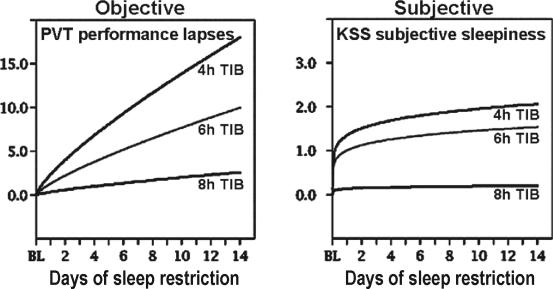Figure 4.
Data from n = 35 subjects (8h condition n = 9, 6h condition n = 13 and 4h condition n = 13). Restriction of nocturnal sleep in healthy adults resulted in near-linear increases in Psychomotor Vigilance Test (PVT) lapses of attention across 14 days (coefficients of change near 1.0), but subjective ratings of sleepiness and fatigue (regardless of the psychometric scale used) showed a nonlinear coefficient below 0.5 for change over days. This meant that as objective performance continued to decline near-linearly, there were only minor further increases in the subjective ratings of sleepiness. By the end of the 14 days of sleep restriction, when performance was at its worst levels, subjects in the 4-h and 6-h sleep period conditions reported feeling only slightly sleepy. Therefore, unlike performance measures, sleepiness ratings appeared to show adaptation to chronic partial sleep deprivation. The lack of reports of intense feelings of sleepiness during chronic sleep restriction may explain why sleep restriction is widely practiced—people have the subjective impression they have adapted to it because they do not feel particularly sleepy. Adapted from Van Dongen et al.12

